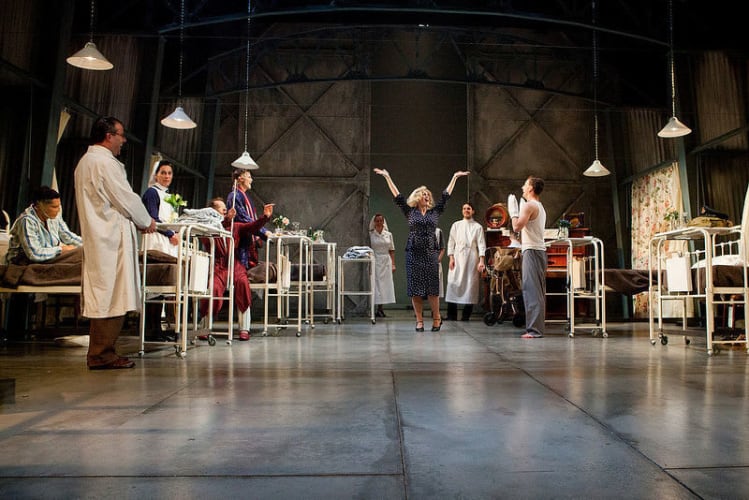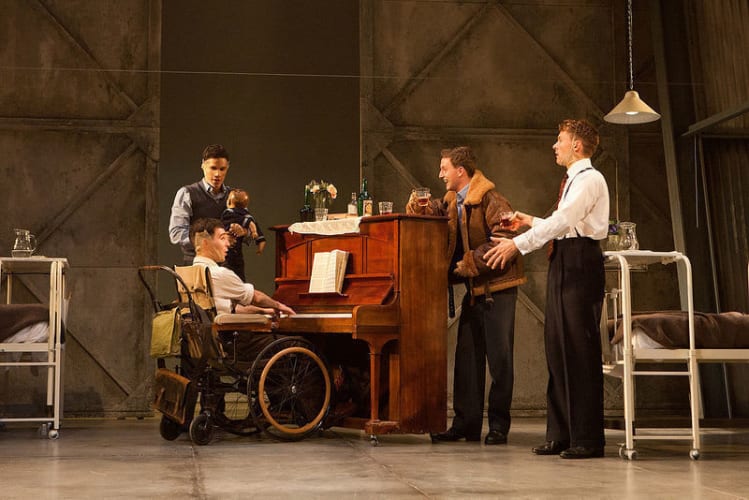The Guinea Pig Club was formed in June 1941 among patients treated at the Queen Victoria Hospital in East Grinstead for extreme burns and other potentially critical injuries resulting from plane crashes and malfunctions. This play sets out to tell the remarkable story of a group of these patients and the surgeon, Archibald McIndoe, whose techniques revolutionised not just the medical field but also the lives of so many wounded men.
It’s a remarkable piece of history, and Damian Cruden’s production of Susan Watkins’s new script does great service to the stories of those involved. McIndoe didn’t only believe in treating the physical symptoms of the injuries but also saw the need to treat the man himself, seeing—and recognising—the psychological impact that such a change in appearance and physical capability would have on anybody, let alone these young pilots barely into their twenties.
An assured cast of young men plays a selection of these patients with conviction and, at times, harrowing truth. Though no graphic scenes of surgery are depicted, the howls of agony and cacophonous cries on the ward are heart-rendingly conveyed. Stefano Braschi is in some ways the focus of the story as Spitfire pilot ‘Rusty’ Rushford. We follow him from first admission to the ward, heavily bandaged and deeply traumatised, believing he has nothing left to live for, through hope and dependency to the possibility of rehabilitation.
Braschi gives a moving and committed performance, as does Anna O’Grady as his nurse Alice Harwood. But the play thrives really on its ensemble strength, with Rollo Skinner, Tim Lewis, George Ure and Al Braatz all interweaving deftly as the boisterous boys on the ward, and Fiona Dolman and Jack Ashton also supporting well. The various injuries are simply but effectively conveyed, and each patient has a clear role within the group and his own demons to battle. The rough Scottish pilot who had only just gained his wings and who uses a ventriloquist’s dummy as both comic prop and channel for his darker thoughts is a particularly fascinating creation. Ure incarnates his role without pathos—as do all the actors—and bashes away at the ivories in a number of effective singalongs round the piano.
Music is used elsewhere, at times to great effect, as the talented Sarah Applewood performs several classic songs of the era, occasionally with slightly adapted lyrics. These work best when counterpointing other action—one moment in particular chillingly juxtaposes the wrenching screams of a patient with jaunty popular music—though their use as interludes to cover the shifting of scenery wears slightly thin by the end of the evening.
This is the largest fault of the script and staging. The set, designed by Joanna Scotcher, is simple, versatile, and elegant, but the sometimes bitty nature of scenes and fiddly changes, to not always massive effect, slows the energy and flow of the play despite Applewood’s commanding vocal performances. It is also a pity that at times the synthetic nature of Christopher Madin’s otherwise beautifully arranged musical backing tracks—particularly the synthesised strings—grates with her wonderful voice.
Graeme Hawley, who recently played the Devil in the massive York Mystery Plays, here seems well fitted to his central role as surgeon Archibald McIndoe. He has a clipped but far from fastidious manner and physicality, and gives a convincing and unsentimental performance. Hawley holds the play together admirably and is a magnetic—not always likeable or trustable—presence.
The script, by the writer Susan Watkins, pays fitting tribute to McIndoe’s work and to the men in his care. While the duty to do this tribute leads to occasionally predictable treatments of the characters, there are enough twists and moments of drama—and this part of the history of World War Two is fundamentally so gripping and so hitherto untold—that this production is well worth a visit.


